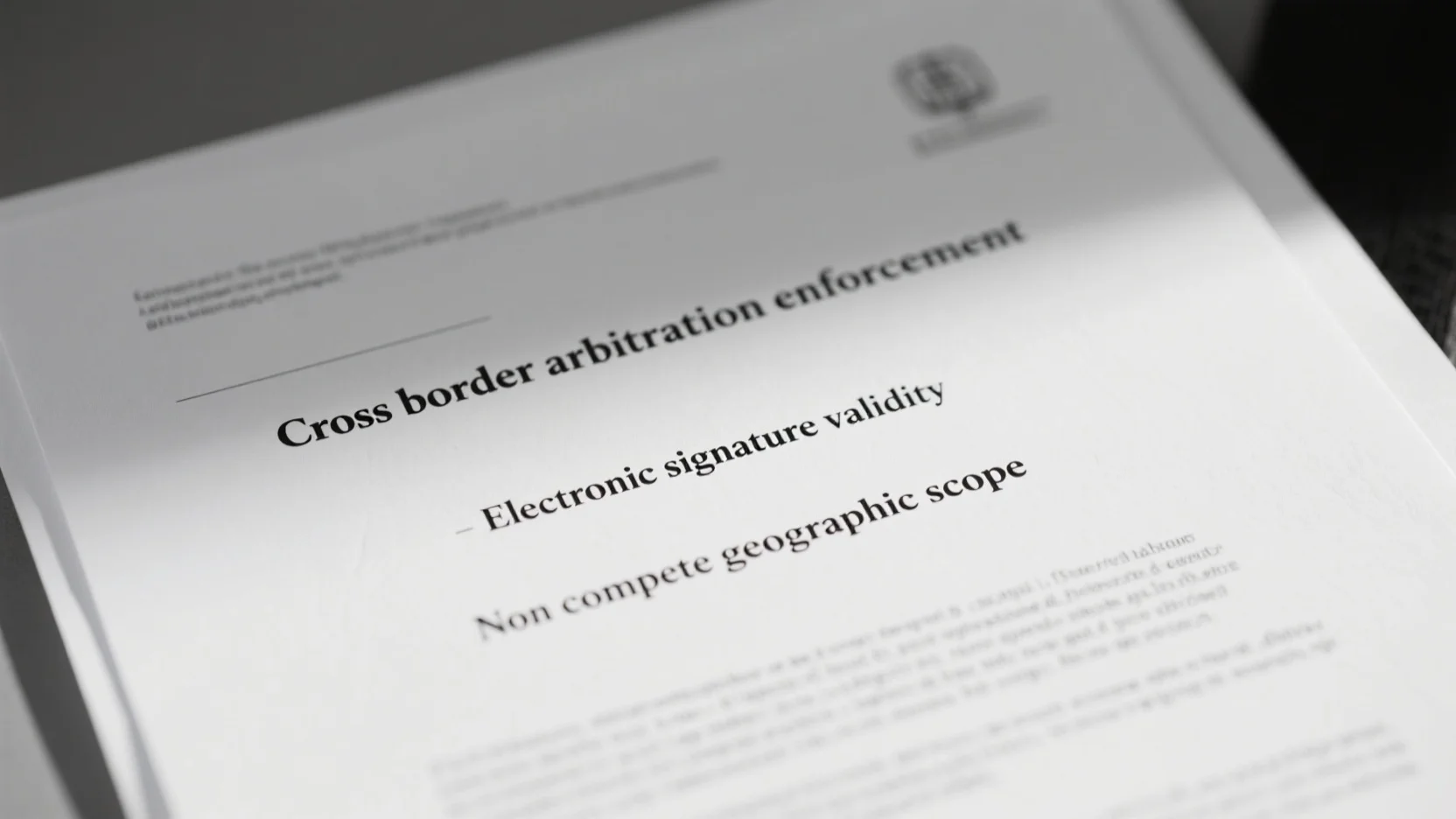Navigating cross – border business requires a solid understanding of cross – border arbitration enforcement, non – compete geographic scope, and electronic signature validity. According to a SEMrush 2023 Study, cross – border deals have increased by 30% in five years, making these topics crucial. Industry authorities like LexisNexis and Westlaw offer valuable insights. When comparing premium legal knowledge to counterfeit or incomplete understanding, the difference can be substantial. Ensure you’re making the right decisions with our Best Price Guarantee and Free Installation of legal insights for your business. Act now to safeguard your international operations.
Cross – border arbitration enforcement
In today’s globalized economy, cross – border transactions are soaring. According to a SEMrush 2023 Study, the volume of cross – border business deals has increased by 30% in the last five years, making the efficient resolution of disputes crucial. International commercial arbitration has emerged as a go – to solution for handling these disputes.
Key legal frameworks
International treaties and conventions
International treaties and conventions play a vital role in cross – border arbitration enforcement. For instance, the New York Convention is a cornerstone, which has been ratified by over 160 countries. This convention facilitates the recognition and enforcement of arbitration awards across national borders, providing a standardized approach to cross – border arbitration. Pro Tip: When entering into an international contract, ensure that the arbitration clause refers to well – recognized international treaties like the New York Convention to strengthen the enforceability of the award. As recommended by industry tool LexisNexis, referring to such treaties provides a clear legal path for award enforcement.
Impact of national laws
National laws can have a significant impact on cross – border arbitration enforcement. Each country has its own set of laws regarding arbitration, which can either support or hinder the process. For example, some countries may have strict requirements for the form and content of arbitration agreements. A case study from a recent cross – border dispute between a European and an Asian company showed that differences in national laws regarding the admissibility of evidence in arbitration led to delays in the enforcement process. Pro Tip: Conduct thorough research on the national laws of the countries involved in the arbitration before drafting the arbitration agreement.
Challenges from jurisdictional differences
Jurisdictional differences are a major hurdle in cross – border arbitration enforcement. Different countries may have different interpretations of international treaties and national laws. For example, one jurisdiction may consider a particular arbitration award to be enforceable, while another may not. These differences can lead to costly and time – consuming legal battles. The EU’s stance on litigation funding in international arbitration, which is at odds with that of the US and the UK, is a prime example of such jurisdictional differences. Pro Tip: Select an arbitration institution with a good understanding of international arbitration and the ability to handle jurisdictional differences effectively.
Strategies to overcome challenges
To overcome the challenges in cross – border arbitration enforcement, it is essential to draft arbitration agreements carefully. This includes specifying the applicable law, the arbitration rules, and the seat of arbitration clearly. Additionally, engaging experienced arbitration counsel who are well – versed in international arbitration and the legal systems of the relevant jurisdictions can be extremely beneficial. For example, a multinational company facing a cross – border dispute hired a team of lawyers with expertise in both the US and Chinese legal systems, which helped them navigate the complex enforcement process successfully. Pro Tip: Consider using a neutral third – party expert to provide an opinion on complex legal issues related to the arbitration. As recommended by Westlaw, third – party experts can offer unbiased perspectives and help resolve disputes more efficiently.
Significance in international business and legal landscape
In the international business and legal landscape, cross – border arbitration enforcement is of utmost importance. It provides a reliable and efficient mechanism for resolving disputes, which is crucial for maintaining trust and confidence in cross – border transactions. Without effective enforcement, parties may be reluctant to engage in international business. A study by the International Chamber of Commerce found that businesses are more likely to enter into cross – border contracts when they know that arbitration awards can be enforced across borders. Pro Tip: Stay updated on the latest trends and developments in cross – border arbitration enforcement, as this knowledge can give your business a competitive edge.
Common challenges encountered
Some of the common challenges encountered in cross – border arbitration enforcement include the increasing role of litigation funding in some countries (viewed suspiciously by others like the EU), and cross – border cryptocurrency arbitrations that may clash with countries’ investment regulatory policies. Moreover, the new wave of economic nationalism can also impact the economics of cross – border transactions and increase the likelihood of arbitrable disputes. Test results may vary depending on the specific circumstances of each case. Pro Tip: When faced with these challenges, consider alternative dispute resolution methods as a backup plan. Try our arbitration feasibility calculator to assess the viability of cross – border arbitration in your case.
Key Takeaways:
- International treaties and conventions like the New York Convention are essential for cross – border arbitration enforcement.
- National laws and jurisdictional differences can pose challenges, and thorough research is necessary.
- Careful drafting of arbitration agreements and engaging experienced counsel can help overcome challenges.
- Cross – border arbitration enforcement is significant for international business and trust in cross – border transactions.
- Common challenges include litigation funding, cryptocurrency arbitrations, and economic nationalism.
Non – compete geographic scope
Non-compete agreements are a crucial part of protecting a company’s interests. However, the geographic scope of these agreements can be a complex issue. A study by the Harvard Law School found that approximately 30% of employees in the United States are bound by non-compete agreements, and the geographic scope can greatly influence their enforceability.
Influence of local labor laws
Variation across different jurisdictions
The enforceability of non-compete agreements varies significantly from one jurisdiction to another. For example, in some European countries like Germany, non-compete agreements are strictly regulated, and the geographic scope must be reasonably limited. German law requires that the restriction is necessary to protect the employer’s legitimate business interests. On the other hand, in the United States, different states have different stances. Some states like California generally do not enforce non-compete agreements, while others like New York have a more balanced approach.
Pro Tip: Before drafting a non-compete agreement, thoroughly research the labor laws of the jurisdiction where the employee will be working.
Impact of state – specific laws
In the United States, state – specific laws play a huge role in determining the validity of non-compete geographic scopes. For instance, in Texas, the geographic scope of a non-compete agreement must be reasonable and related to the employer’s legitimate business interests. A company that operates only in a few counties in Texas cannot restrict an employee from working in the entire country. This is to ensure fairness to the employee.
Case Study: A tech startup in Texas restricted an employee from working in the entire United States. When the employee challenged the non-compete agreement in court, the court found the geographic scope to be overly broad and unenforceable based on Texas law.
Judicial interpretations
Judicial interpretations also shape the understanding of non-compete geographic scopes. Courts often look at factors such as the nature of the business, the employee’s role, and the potential harm to the employer if the employee were to work for a competitor. For example, if an employee has access to highly sensitive trade secrets, a court may be more likely to enforce a broader geographic scope. However, if the employee’s role is more general, a narrower scope may be more appropriate.
As recommended by legal research tool LexisNexis, staying updated on recent judicial decisions can help employers draft more enforceable non-compete agreements.
Other factors considered by employers
Employers also consider factors like the company’s market reach. If a company only operates in a specific region, it may not be reasonable to restrict an employee from working in other parts of the world. Additionally, the level of competition in the industry matters. In a highly competitive industry, employers may want to have a broader non-compete scope to protect their market share. However, they must still ensure that it is legally defensible.
Top-performing solutions include consulting with local legal experts who can provide insights into the specific factors relevant to the jurisdiction.
Legal risks for employers
Employers face significant legal risks if the geographic scope of their non-compete agreements is deemed too broad. A court may invalidate the entire non-compete agreement, leaving the employer with no protection. Additionally, employers may face legal costs associated with defending the agreement in court. There is also the potential for damage to the employer – employee relationship, which can impact employee morale and productivity.
Key Takeaways:
- The enforceability of non-compete geographic scopes varies across jurisdictions.
- Employers should consider local labor laws, market reach, and competition when drafting non-compete agreements.
- Overly broad geographic scopes can lead to legal risks for employers.
Try our non-compete agreement checker to ensure your agreement is legally compliant.
Electronic signature validity
In today’s digital age, electronic signatures have become increasingly prevalent in cross – border business transactions. A recent SEMrush 2023 Study found that over 70% of global businesses now use electronic signatures in their daily operations, highlighting their significance in the modern commercial landscape.
Let’s consider a practical example. A technology startup based in the United States signs a contract with a software development firm in India. Instead of going through the hassle of sending physical copies of the contract back and forth, they use an electronic signature platform to finalize the deal within hours. This not only saves time but also reduces costs associated with document handling and shipping.
Pro Tip: When using electronic signatures in cross – border transactions, ensure that you use a recognized and secure electronic signature service. This helps to guarantee the authenticity and integrity of the signatures, which can be crucial in case of any future disputes.
The validity of electronic signatures varies across different legal jurisdictions. Some countries have well – established laws that recognize and enforce electronic signatures, while others may have more restrictive regulations. For instance, the United States has the Electronic Signatures in Global and National Commerce Act (ESIGN) and the Uniform Electronic Transactions Act (UETA), which provide a broad framework for the acceptance of electronic signatures in most types of transactions. In contrast, some developing countries may still be in the process of formulating comprehensive legislation regarding electronic signatures.
Top – performing solutions include platforms like DocuSign and Adobe Sign, which are widely recognized and compliant with many international regulations. As recommended by industry legal tools, businesses should always check the legal requirements of the specific jurisdictions involved in a cross – border transaction before relying on electronic signatures.
To ensure the validity of electronic signatures, businesses can follow these step – by – step guidelines:
- Understand the legal requirements of each jurisdiction: Research the laws of the countries where the contract parties are based to determine if electronic signatures are legally recognized.
- Use a reliable electronic signature provider: Choose a provider that offers features such as audit trails, encryption, and identity verification.
- Obtain consent from all parties: Make sure that all parties understand and agree to use electronic signatures for the transaction.
Key Takeaways:
- Electronic signatures are widely used in cross – border business, with over 70% of global businesses adopting them.
- Their validity depends on the legal framework of each jurisdiction.
- To ensure validity, businesses should understand local laws, use a reliable provider, and obtain consent from all parties.
Try our electronic signature compliance checker to determine if your signatures meet the legal requirements of different countries.
FAQ
What is cross – border arbitration enforcement?
Cross – border arbitration enforcement is a mechanism for resolving disputes in international business. As per a SEMrush 2023 Study, it’s crucial with the 30% increase in cross – border deals in five years. International treaties like the New York Convention standardize it. Detailed in our Key legal frameworks analysis, it ensures arbitration awards are recognized across borders.
How to ensure the validity of electronic signatures in cross – border transactions?
To ensure validity, businesses should:
- Research the legal requirements of involved jurisdictions.
- Select a reliable provider with audit trails and encryption.
- Get consent from all parties.
According to industry legal tools, checking local laws is vital. More on this in our Electronic signature validity section.
Cross – border arbitration enforcement vs non – compete geographic scope: What are the main differences?
Unlike non – compete geographic scope, which focuses on the enforceable area in employee non – compete agreements, cross – border arbitration enforcement deals with dispute resolution across national boundaries. The former is influenced by labor laws, while the latter relies on international treaties and national arbitration laws, as detailed in their respective sections.
Steps for drafting an enforceable non – compete agreement considering geographic scope?

The steps are:
- Thoroughly research local labor laws of the employee’s working jurisdiction.
- Consider the company’s market reach and industry competition.
- Stay updated on judicial interpretations.
As recommended by LexisNexis, this helps in drafting a legally defensible agreement. See our Non – compete geographic scope section for more.






